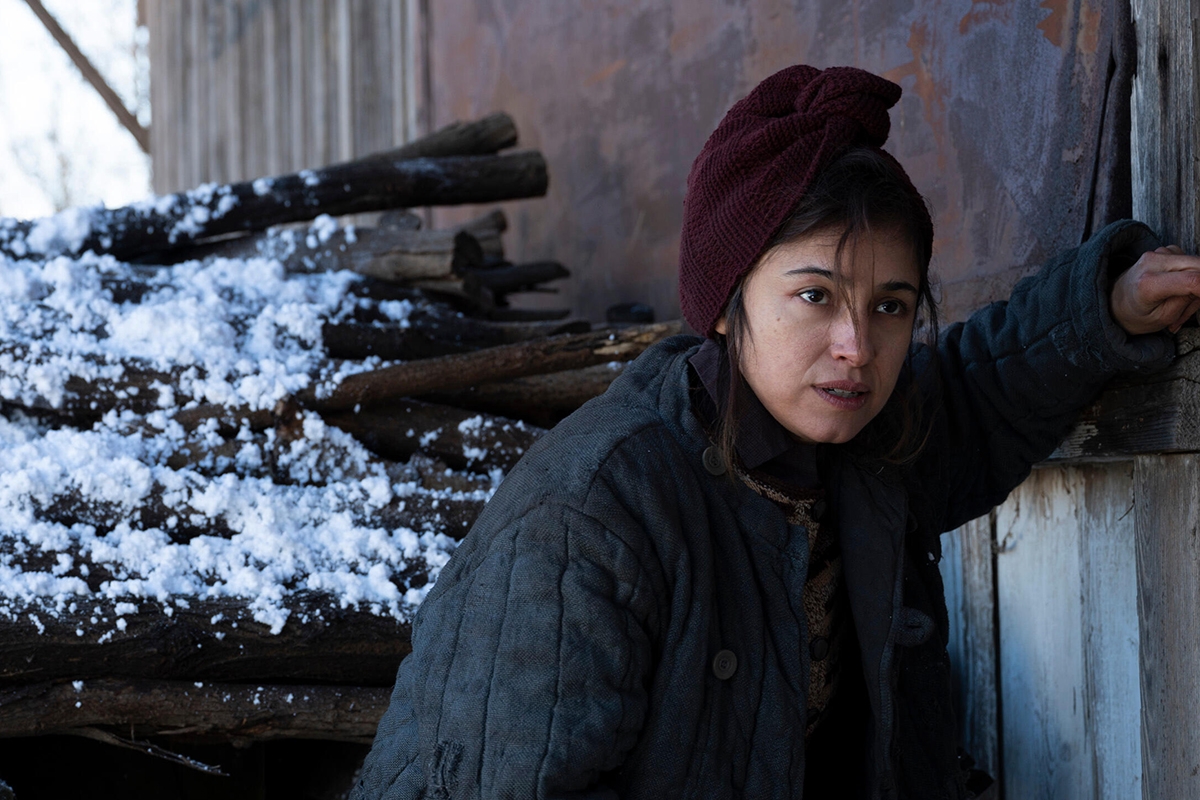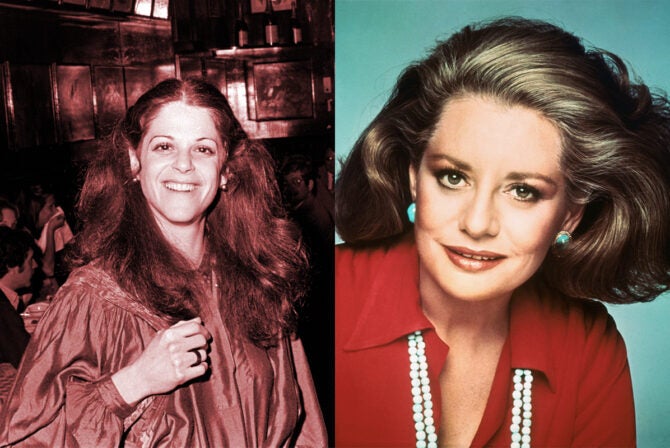This month, you can watch Moran Rosenblatt in two very different Holocaust-related projects.
The first is the delightful and surprisingly timely lesbian rom-com “Kiss Me Kosher,” a movie which is currently out in cinemas in New York and Florida, and on video on demand. Rosenblatt plays the Israeli Shira who is dating a non-Jewish German woman Maria, played by Luise Wolfram. The movie explores how romance intersects with her relationship with Shira’s Holocaust survivor grandmother and Maria’s own family history.
The other is Hulu’s Holocaust drama “We Were the Lucky Ones,” in which she plays Herta, the wife of Genek Kurc, the eldest brother of the Kurc family, whose tale of survival unfolds in the show.
Rosenblatt’s portrayal of Herta is one that really took me by surprise with its intensity, especially in the third episode, when she gives birth at a Siberian work camp. It’s a scene that I practically felt in my womb, making me think of all the women who gave birth during the Holocaust, including my own great-grandmother.
I really shouldn’t have been surprised by Rosenblatt’s incredible performance in this show. The award-winning actress proved her chops and fierceness in shows like “Fauda,” Netflix’s “Hit & Run” and most recently Amazon’s “Yosi the Regretful Spy.”
Kveller spoke to her about how motherhood changed her perception of the role, her favorite Passover traditions and how she thinks about authentic casting.
This interview has been condensed and edited for clarity.
I keep going back to that scene in which Herta gives birth. As someone who has had two kids… it was just so powerful.
I had my first child a month and a half ago.
Wow!
Yes, this is my water for breastfeeding.
Did you think differently about that scene after giving birth?
Herta is going through not only a hard labor, but she’s almost dying. She’s not eating, not drinking; the conditions [in Siberia] are so hard. So I wanted to take a labor and to do it 10 times worse than a regular labor. And then, after the first hour of my labor, I said, OK, it was harder than what I did with Herta — in the first hour! I discovered that labor is a million times harder than what I could have imagined.
Before the scene, I watched so many labors on YouTube. I kind of thought I knew what to expect, but I didn’t.
I feel like that’s everything with motherhood. You don’t know until you experience it.
That’s very accurate. I knew nothing. Nothing! Mostly I knew nothing of the extreme love.
That’s what I love about that scene. You see the extreme pain, but then, a few moments later, you see the extreme and instantaneous love Herta has for this baby. Can you talk about how this role got to you and what drew you to Herta’s character?
I first got the audition to read for Mila’s character [Hadas Yaron]. There were some really hard scenes, and when I was shooting [the audition tapes] I was abroad in Uruguay [shooting the Amazon drama “Yosi, the Regretful Spy”]. I was in my hotel room, and I was really, really amazed by this project. It was so well-written — just from reading three scenes. Then I met Erica [Lipez] the showrunner and Tommy Kail [the director] by Zoom. We talked, and they heard my energy. Then they offered me the role of Herta. I think they were so on point with casting the whole cast. Everyone is so different from each other and the couples are so perfectly matched.
Herta is such a badass.
Yes, definitely. She has some lines you need to hang on your wall.
She kind of “wears the pants” in the relationship — I hate that expression, but you know what I mean?
It’s funny that you say that because what I sensed from her is how much she is a woman that loves to be her husband’s woman. It goes with her being so brave. I really fell in love with her. I think she has some of the most beautiful lines in this group. She lights up the room, she gives you this energy. To portray her [I was searching for] this specific energy to not fall into your circumstances. She has that energy to keep going. She’s coming onto him in the middle of the camps, she keeps the sexual energy and humor alive during this whole thing.
She saves Genek in a lot of ways.
Well, she’s a woman, of course she saves him!
What was the rapport like with Henry Lloyd-Hughes, who plays Genek?
We were a perfect match from the beginning. In the first Zoom we had for the whole cast, Henry was late and he came into the Zoom and he didn’t stop talking, making jokes. Everybody was so quiet, keeping their shields up of first impressions, listening to what the production has to say, and Henry was like “rah rah rah!” from the beginning, and I loved it. Because he was not protecting himself, he was very open. For me, an open heart was the most important thing. It bought me from the very first moment and we enjoyed working together a lot and became really good friends.
Was there anything in your family history that drew you to this project?
In my father’s side of the family are some survivors, and some who did not survive. They actually ran to Belgium from Poland. The people that survived didn’t go through the camps, but they had family that didn’t survive. But my father never talked about it with his parents. And I never met his parents. They died before I was born. They didn’t talk about it at all.
So you don’t really know the story.
I just know the pictures of the people who are gone. And my father… it’s OK for me not to know, but my father didn’t know the stories of his parents. It was very common to not talk about it.
What do you think about authentic casting? You’re a Jewish person playing a Jewish role here, but also as a queer person, you play a lot of queer roles. Do you think it’s important?
I think actors should act, should play the opposite of them and a whole range of characters. It’s very natural, I think, for Jewish actors that grew on those stories to [play these roles]. For instance, a German [looks] at these major events in history from the opposite point of view. It’s such a big difference than to watch it from the victim’s point of view, to act from the other side’s point of view. So I can see why people have cast LGBT people for LGBT roles and Jewish [people in] Jewish roles, but it’s not a must for me.
I also have mixed feelings, but there’s something so moving about it. For example, the Passover scenes felt like a real holiday scene, and that translates to all the Jewish people who are sitting at home and feeling represented. What is Passover like in your home?
I have to be there. I can’t miss it. My mother would kill me. We sing the songs. We do the whole charade.
What’s your favorite part of the seder?
My mother’s family is from Iran so when we sing “Dayenu,” we hit each other with…
The leeks?
Yes, the leeks! When we sing the chorus. When we were kids we used to get injured quite a lot.
Are you excited for your first Passover as a parent?
Yes! I haven’t thought about it but I am… One day he will be singing “The Four Questions.”
A lot has changed since you shot this project. You became a parent, and October 7 happened. Has it changed the way you see this show?
Definitely. It’s hard to be happy, but I am very proud of this project. It’s OK to feel everything together. To be happy with the new project and proud and also to feel sad for all the sad stuff that happened — the hostages, the war, the people that are getting killed every day on both sides.
I was a person who thought that antisemitism is not a part of the world now. I’ve refused to speak about subjects like it — I thought it was in the past. We are telling a story, a beautiful story, about history, and history is always relevant, but so much more now. When October 7 happened and antisemitism in the world rose, I was shocked at how blind I was before.
I really hope people will be so in love and intimate with these characters that they will not think about what religion they are — they just will feel their feelings.








